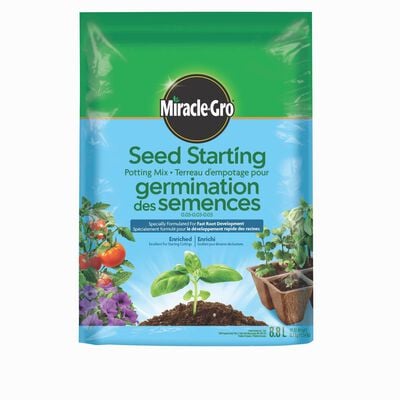
Indoor Herb Gardening Tips & How To
Enjoy Fresh Herbs, Even In Winter
Nothing beats fresh herbs to improve and enhance your cooking. With the right selection and conditions, it's possible to grow herbs right in your home, even in the dead of winter. Transplant herbs from your garden, buy seedlings from your local nursery or start from scratch with seeds.
Grow Your Herbs on The Sunny Side
Indoor herbs need as much sun as they can get, so be sure to place them in a sunny spot, preferably in a south-facing window. (Windows facing east or west should also work, but north-facing windows won't get enough light.) You can also choose to supplement the sun with a grow lamp that can shine on your herbs for up to 12 hours a day. Find grow lamps at your local garden center or online.
Plant Your Herbs in Quality Soil
Your herbs will need ample nutrients, oxygen and moisture at the root level. Always use a quality potting mix, such as Miracle-Gro® Organics Garden Mix for Vegetables and Herbs, that will allow for proper airflow and drainage so your herbs can root deeply and thrive.
Growing Your Herbs from Seeds
If growing from seed, look for newer varieties that are dense and compact, since they are more likely to grow better in containers. Plant seeds in a seed starting mix, such as Miracle-Gro® Seed Starting Potting Mix. Plant most herb seeds no deeper than of an inch deep, or simply sprinkle them on top of the soil and cover loosely. Cover the container with a plastic dome or bag, and place in a warm spot out of direct sunlight until the seeds germinate. Once your seeds have started to germinate, remove the plastic cover and move to a sunny location.
Growing Transplanted Herbs
Herbs taken straight from an outdoor sunny spot to an indoor spot can go into a sort of light-deprivation shock. Help herbs adjust by gradually acclimating them to lower light levels. Move them from full sun to a spot that receives partial sun for two weeks, then to deeper shade for another one to two weeks before moving them indoors.
Watering and Feeding Your Herbs
Avoid over-watering your herbs. Let the potting mix dry down between waterings. Stick your finger in the potting mix up to your knuckle. If it?s dry, it?s time to water. Water thoroughly, until you see pooling near the container holes. Apply the water to the base of the plant, and try to keep water off the leaves. To promote a long growing-period, feed your herbs every two weeks with Miracle-Gro® Organics Plant Food for Vegetables & Herbs.
Maintaining and Enjoying Your Herbs
Frequent, light pruning of your herb plants not only means that you get to enjoy them in your cooking but also helps keep your plants compact and growing new leaves. Pruning will prevent your plants from growing too tall, and harvesting often helps extend the growing period of your herbs so you can get the most out of them. Keep an eye out for flowers, and pinch them off just below the bud as soon as you see them appear.
